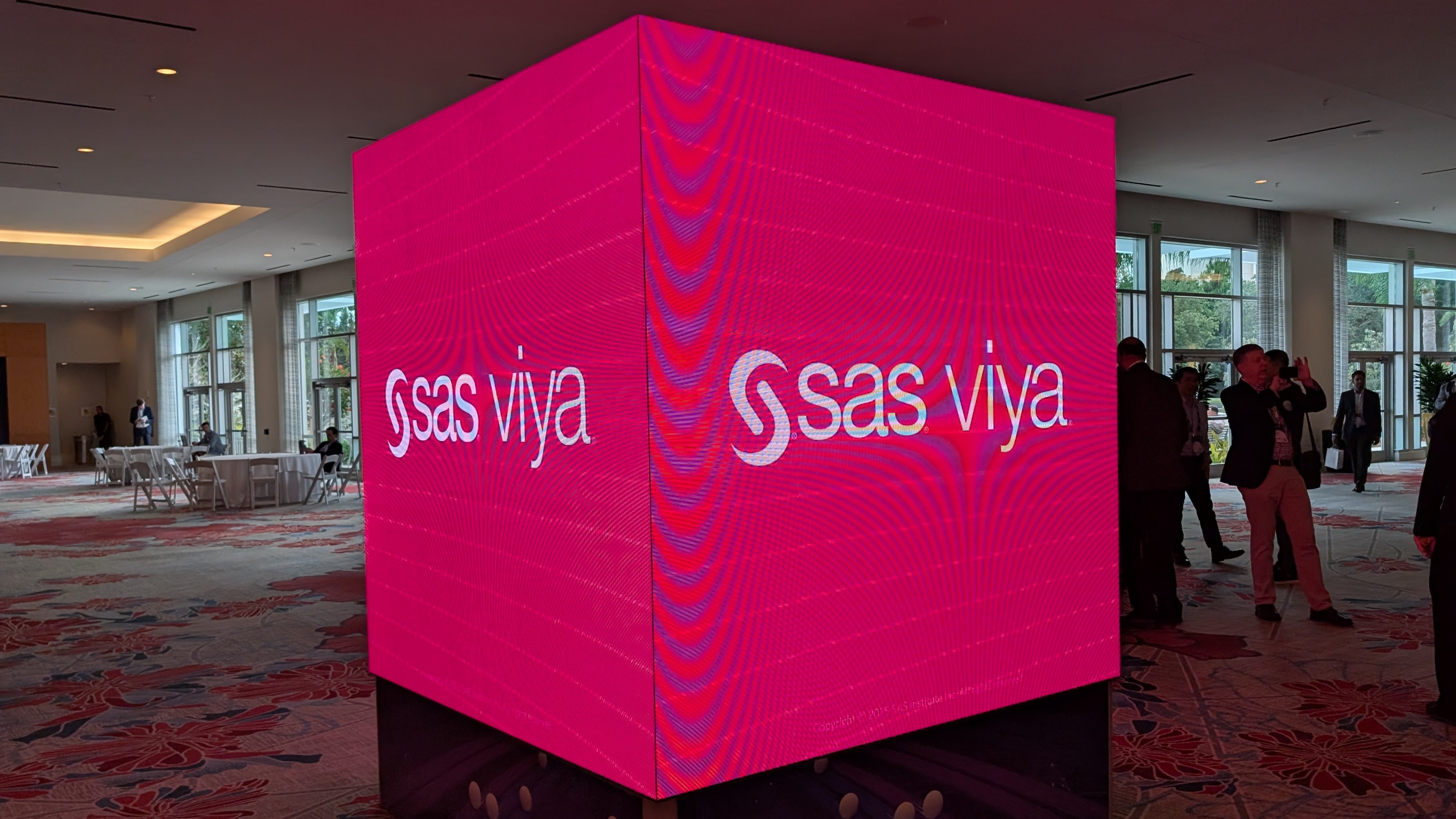SAS wants its AI agents to supercharge workers, not replace them
With a long-term goal to make off-the-shelf AI for every sector, SAS opened its annual conference with a focus on tailor-made models


Sign up today and you will receive a free copy of our Future Focus 2025 report - the leading guidance on AI, cybersecurity and other IT challenges as per 700+ senior executives
You are now subscribed
Your newsletter sign-up was successful
SAS has announced a new offering to help organizations design and deploy AI agents alongside domain-specific AI models.
Intended to streamline the path to AI adoption across protected industries, SAS Intelligent Decisioning will be made available through the firm’s cloud-based AI and analytics platform SAS Viya.
The announcement was made at SAS Innovate 2025, its annual conference held at the Hilton Orlando in Florida. Underlining the launch, SAS stressed the importance of AI agents that work alongside and enhance human activity, rather than automating or entirely supplanting it.
SAS Intelligent Decisioning will be focused on helping AI teams to design reliable AI agents which show transparent decision making and follow organizational guardrails.
Developers can decide how much autonomy to grant AI agents made on the platform, defining tasks that are better suited to human work or human-agent collaboration due to their complexity or ethical subjectivity.
The platform’s integrated governance capabilities will help leaders track the extent to which AI agents made within it follow data privacy laws, AI regulation, and AI ethics principles.
“SAS Viya builds agents that don’t just act – they decide with purpose, guided by analytics, business rules and adaptability and grounded by decades of SAS’ trusted governance,” said Marinela Profi, global AI market strategy lead at SAS.
Sign up today and you will receive a free copy of our Future Focus 2025 report - the leading guidance on AI, cybersecurity and other IT challenges as per 700+ senior executives
“SAS’ unified, governed, decision-first framework turns AI agents from a science experiment to a business differentiator.”
Domain-specific models for faster adoption
SAS has a long-term goal of making agentic AI faster and easier to adopt, with plans to launch off-the-shelf agents trained to excel in tasks such as supply chain management or data engineering.
While these aren’t yet available, the data and analytics veteran used SAS Innovate as a platform to announce new domain-specific AI models. These can be deployed as-is by SAS customers, or fine-tuned with customer data.
For example, a new Strategic Supply Chain Optimization model helps leaders make data-driven decisions by using enterprise supply chain data to produce demand forecasts, plans for inventory and supply optimization, and efficiency improvements.
Another model, Tax Compliance for Sales Tax, has been billed as helpful for public sector organizations looking to identify tax noncompliance. It was trained on real-world tax data to provide compliance teams with analytics, visualizations, and auditing information to speed up the time taken reviewing tax documents.
SAS also announced models that cross sectoral boundaries. For example, its Document Analysis model can be used to process scanned documents for data analytics and reporting, leaning on traditional automation techniques such as robotic process automation to meet large-scale digitization of paper documents.
The AI Driven Entity Resolution model can also locate and link data across a customer’s ecosystem and has been identified by SAS as useful for many industries including banking, healthcare, the public sector, and insurance. It can also be used for data deduplication, data preparation, and fuzzy matching.
Later in 2025, SAS will release further AI models aimed at fraud decisioning in banking, payment integrity in the healthcare sector, tax compliance in the public sector, and worker safety monitoring in the manufacturing sector.
MORE FROM ITPRO

Rory Bathgate is Features and Multimedia Editor at ITPro, overseeing all in-depth content and case studies. He can also be found co-hosting the ITPro Podcast with Jane McCallion, swapping a keyboard for a microphone to discuss the latest learnings with thought leaders from across the tech sector.
In his free time, Rory enjoys photography, video editing, and good science fiction. After graduating from the University of Kent with a BA in English and American Literature, Rory undertook an MA in Eighteenth-Century Studies at King’s College London. He joined ITPro in 2022 as a graduate, following four years in student journalism. You can contact Rory at rory.bathgate@futurenet.com or on LinkedIn.
-
 ITPro Best of Show NAB 2026 awards now open for entries
ITPro Best of Show NAB 2026 awards now open for entriesThe awards are a fantastic opportunity for companies to stand out at one of the industry's most attended shows
-
 Mistral CEO Arthur Mensch thinks 50% of SaaS solutions could be supplanted by AI
Mistral CEO Arthur Mensch thinks 50% of SaaS solutions could be supplanted by AINews Mensch’s comments come amidst rising concerns about the impact of AI on traditional software
-
 Kyndryl wants to help enterprises keep AI agents in line – and avoid costly compliance blunders
Kyndryl wants to help enterprises keep AI agents in line – and avoid costly compliance blundersNews Controls become machine‑readable policies that AI agents can read and must obey
-
 Google says hacker groups are using Gemini to augment attacks – and companies are even ‘stealing’ its models
Google says hacker groups are using Gemini to augment attacks – and companies are even ‘stealing’ its modelsNews Google Threat Intelligence Group has shut down repeated attempts to misuse the Gemini model family
-
 Why Anthropic sent software stocks into freefall
Why Anthropic sent software stocks into freefallNews Anthropic's sector-specific plugins for Claude Cowork have investors worried about disruption to software and services companies
-
 Want to deliver a successful agentic AI project? Stop treating it like traditional software
Want to deliver a successful agentic AI project? Stop treating it like traditional softwareAnalysis Designing and building agents is one thing, but testing and governance is crucial to success
-
 OpenAI's Codex app is now available on macOS – and it’s free for some ChatGPT users for a limited time
OpenAI's Codex app is now available on macOS – and it’s free for some ChatGPT users for a limited timeNews OpenAI has rolled out the macOS app to help developers make more use of Codex in their work
-
 B2B Tech Future Focus - 2026
B2B Tech Future Focus - 2026Whitepaper Advice, insight, and trends for modern B2B IT leaders
-
 What the UK's new Centre for AI Measurement means for the future of the industry
What the UK's new Centre for AI Measurement means for the future of the industryNews The project, led by the National Physical Laboratory, aims to accelerate the development of secure, transparent, and trustworthy AI technologies
-
 ‘In the model race, it still trails’: Meta’s huge AI spending plans show it’s struggling to keep pace with OpenAI and Google – Mark Zuckerberg thinks the launch of agents that ‘really work’ will be the key
‘In the model race, it still trails’: Meta’s huge AI spending plans show it’s struggling to keep pace with OpenAI and Google – Mark Zuckerberg thinks the launch of agents that ‘really work’ will be the keyNews Meta CEO Mark Zuckerberg promises new models this year "will be good" as the tech giant looks to catch up in the AI race